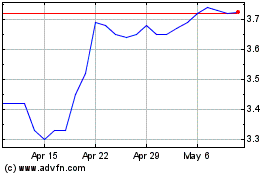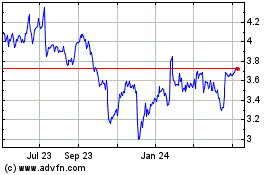By Jay Greene and Matthias Verbergt
Ten months after writing down much of its disastrous acquisition
of Nokia Corp.'s handset business, Microsoft Corp. took another
step to unwind the deal.
Microsoft on Wednesday agreed to unload its low-end phone
business, acquired from Nokia, to FIH Mobile Ltd., a subsidiary of
Hon Hai/Foxconn Technology Group, and HMD Global Oy for $350
million. In a separate but related transaction, Nokia entered into
licensing pacts with FIH Mobile and HMD Global to put its brand
once again on mobile handsets.
The deal highlights how sharply Microsoft Chief Executive Satya
Nadella has shifted the company's mobile strategy since his
predecessor, Steve Ballmer, championed the Nokia deal, which closed
in 2014. Last summer, Microsoft wrote down about 80% of the $9.4
billion deal, cutting 7,800 workers, mostly in its mobile-phone
business. The software giant hasn't given up on phones. But its
latest strategy revolves around Windows 10, the most recent version
of its flagship operating system that runs on various devices
including smartphones, PCs, tablets, and game consoles.
Microsoft also is developing services that behave intelligently
based on data gathered by smartphones and other devices. At a
conference for software developers in March, the company showed how
its voice-activated digital assistant, Cortana, could book a hotel
room or order a pizza proactively based on a user's personal data
and preferences.
The low-end phone business that Microsoft sold on Wednesday
doesn't fit with that strategy. The entry-level phones known as
feature phones lack the computing horsepower to run Windows 10.
"The future [of Microsoft's mobile business] has to lie with
Windows 10," said J.P. Gownder, a Forrester Research Inc.
analyst.
A Microsoft spokesman said the company is "committed to a
vibrant Windows Phone market" and that it will continue to develop
Windows 10 for mobile devices. The company also will invest in
mobile security and management features.
Feature phones, though, are the one area of the mobile-device
market that Microsoft leads. The company shipped 15.7 million
feature phones world-wide in the first quarter of 2016, ahead of
Samsung Electronics Co., which shipped 13.1 million entry-level
phones, according to IDC Research Inc.
But Microsoft isn't well suited to squeeze profit from feature
phones, which produce thin margins, Mr. Gownder said. Foxconn, by
contrast, has the manufacturing scale to eke more efficiency from
the business.
For Nokia, the deal is a re-entry into the handset market after
the company, once the leader in mobile phones, refashioned itself
into a maker of wireless and Internet network equipment. The
Finnish company said it is hoping to capitalize on its brand name
in developing countries starting with entry-level phones.
It plans to offer higher-end smartphones and tablets later.
Nokia said it had granted patent and design rights to HMD
Global, a newly created company based in Finland that will be in
charge of global marketing through a 10-year exclusive agreement.
HMD is majority-owned by a private- equity fund managed by
Jean-François Baril, a former Nokia executive. Nokia said it had
signed manufacturing agreements with a subsidiary of Foxconn, the
Taiwanese company and main assembler of Apple Inc.'s iPhones.
Microsoft's sale of the feature phone business is Mr. Nadella's
latest retrenchment after the failure of Mr. Ballmer's repeated
efforts to build a smartphone business.
The company's effort was launched in 2003 under the banner of
Windows Mobile, a mobile-operating system designed for business
customers.
That campaign sputtered as BlackBerry Ltd., and later Apple's
iPhone and phones running the Android operating system, seized the
market.
Microsoft shifted its focus to consumers in 2010, debuting the
Windows Phone operating system. However, that initiative failed to
gain a significant share of burgeoning smartphone sales.
Since becoming chief executive, Mr. Nadella has trimmed the
company's device lineup, released versions of popular Microsoft
applications for Android and iPhones, and reverted Microsoft's
focus in phones to business users.
Nonetheless, Microsoft's share of the world-wide smartphone
market slid to 1.1% in the fourth quarter of 2015, according to
Gartner Inc.
Its success in raising that number will depend on putting
Windows 10 on as many devices as possible, including smartphones,
personal computers, laptops, and its Xbox game consoles.
Microsoft is betting that a huge base of Windows 10 users will
convince developers to create must-have apps and lure mobile
customers to the platform. The operating system, released last
summer, runs on 300 million active devices by the latest count.
As part of Wednesday's sale, FIH Mobile also will acquire
Microsoft Mobile Vietnam, which runs the company's Hanoi, Vietnam,
manufacturing facility. The operation's roughly 4,500 employees
will transfer to, or have the opportunity to join, FIH Mobile or
HMD Global, according to Microsoft.
Write to Jay Greene at Jay.Greene@wsj.com and Matthias Verbergt
at Matthias.Verbergt@wsj.com
(END) Dow Jones Newswires
May 19, 2016 02:49 ET (06:49 GMT)
Copyright (c) 2016 Dow Jones & Company, Inc.
Nokia (NYSE:NOK)
Historical Stock Chart
From Mar 2024 to Apr 2024

Nokia (NYSE:NOK)
Historical Stock Chart
From Apr 2023 to Apr 2024
